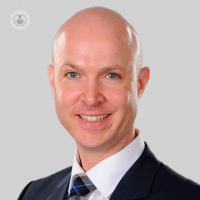What is vestibular migraine?
Written by:Vestibular migraine is a condition in which you may experience repeated episodes of dizziness and vertigo. You may not necessarily experience headaches at the same time of these symptoms, however. Professor Owen Judd, a top ENT surgeon with a special interest in neurotology (disorders of the brain and ear), explains what vestibular migraine is and how it can be treated.

What is the difference between vestibular migraine and vertigo?
Vestibular migraine is a distinct diagnosis, whereas vertigo is a symptom experienced in many different conditions, one of which is vestibular migraine. Vertigo is the hallucination of movement, i.e. feeling as if you or your environment is moving, when you know it is actually still.
What’s the difference between vestibular migraine and Meniere’s disease?
Vestibular migraine and Meniere’s disease are different, but they do share some similarities. Meniere’s disease is actually rare and often misdiagnosed, whereas it is more likely a patient will have vestibular migraine, which is extremely common.
How is vestibular migraine diagnosed?
Vestibular migraine is diagnosed on the description of symptoms to the doctor, known as a history of complaint. It has characteristics which identify the condition, one of which is visual disturbance during dizzy spells. Diagnostic examination, tests and investigations are often normal.
Do we know what causes a vestibular migraine?
There have been a number of causes postulated in vestibular migraine, such as genetic, environmental and triggers. The most common triggers are stress and anxiety, tiredness, hunger, dehydration and many types of food and drink, especially caffeine.
Why are certain people more likely to be affected?
Patients with other types of migraine, such as the headache varieties or a family member with migraine are more susceptible to developing the condition. Also, other conditions presenting with dizziness can often coincide with vestibular migraine.
How is vestibular migraine treated?
The main method of treatment for vestibular migraine is to avoid trigger factors. Additional to this, there are medications available to avoid acute episodes of this condition, as well as prophylactic medications. Also important in treating vestibular migraine is patient education. The better a patient understands their condition and triggers, the better they are at reducing symptoms.
The following are made clear to patients as being helpful in reducing episodes of vestibular migraine:
- Good stress management
- Practising good sleep hygiene
- Having regular meals with good nutritional value
Abortive medications are designed to shorten or stop the duration of an attack. Recommended medications include over-the-counter painkillers, NSAIDs (e.g. ibuprofen), Triptans and intravenous steroids.
Prophylactic medications can be used if abortive treatments fail to work or are not sufficient. These are often offered to patients who are severely impaired by their vestibular migraines. These medications can include tricyclic antidepressants, such as amitriptyline, nortriptyline, and topiramate or sodium valproate.
More recently, there have been new treatments used in some cases of vestibular migraine. These have included:
- Neurostimulation and nerve decompression
- Botulinum toxin
- Calcitonin gene-related peptides (CGRPs)
- Transcranial magnetic stimulation


